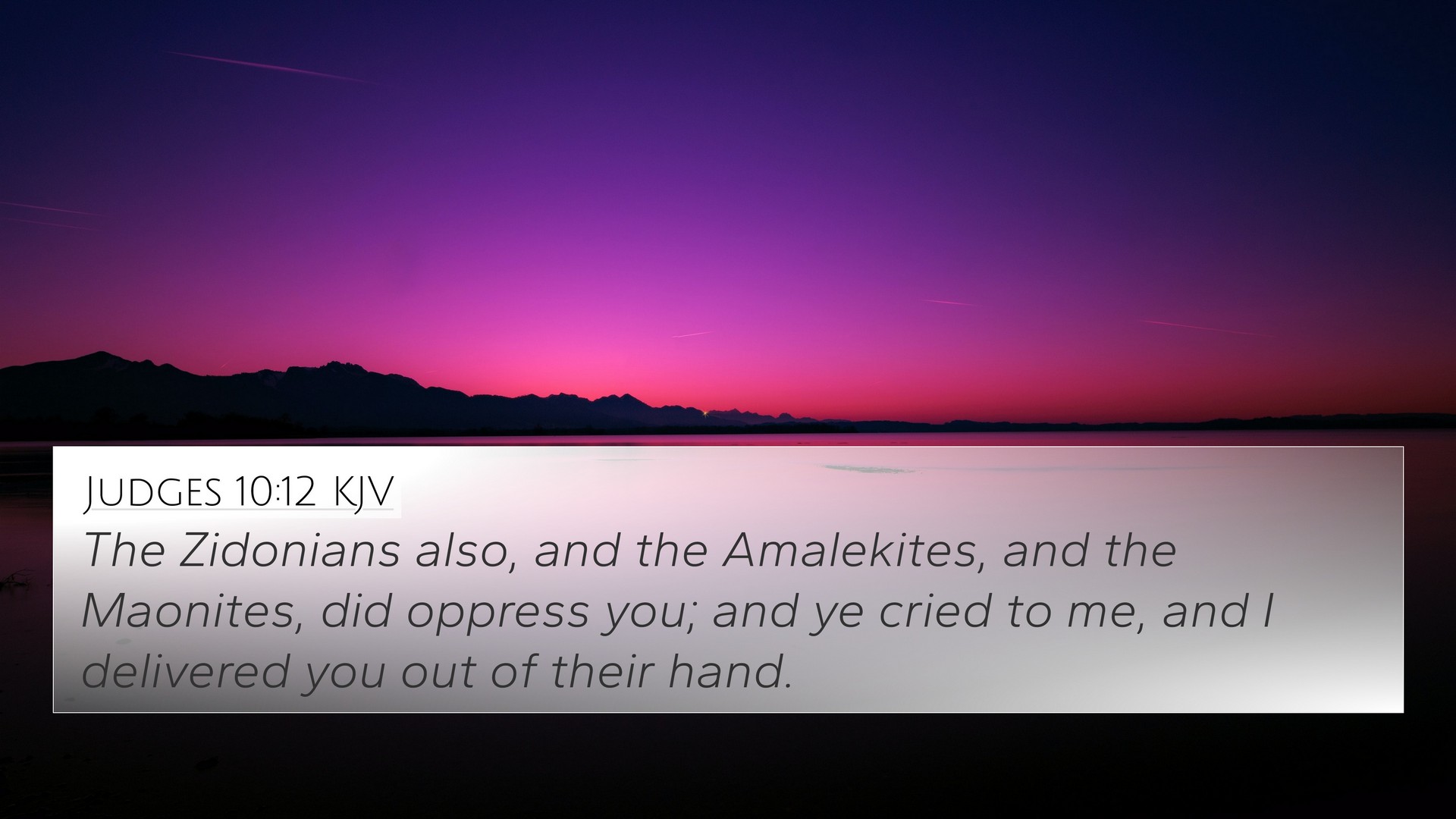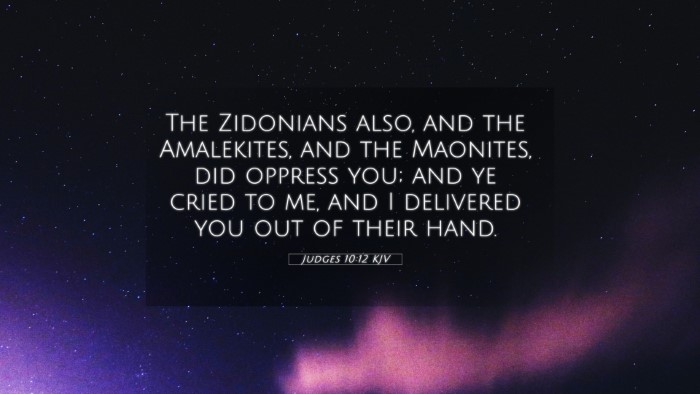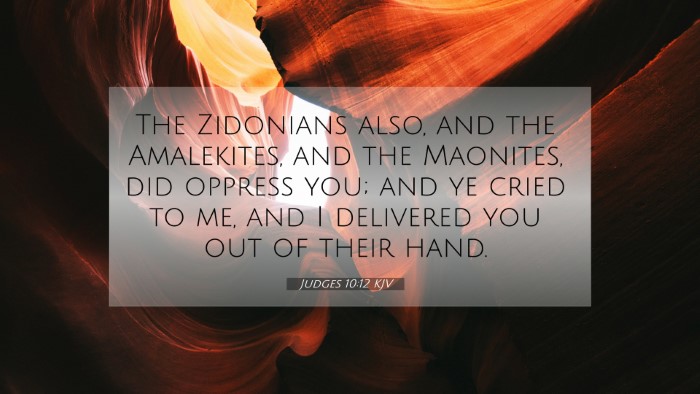Old Testament
Genesis Exodus Leviticus Numbers Deuteronomy Joshua Judges Ruth 1 Samuel 2 Samuel 1 Kings 2 Kings 1 Chronicles 2 Chronicles Ezra Nehemiah Esther Job Psalms Proverbs Ecclesiastes Song of Solomon Isaiah Jeremiah Lamentations Ezekiel Daniel Hosea Joel Amos Obadiah Jonah Micah Nahum Habakkuk Zephaniah Haggai Zechariah MalachiJudges 10:12 Similar Verses
Judges 10:12 Cross References
The Zidonians also, and the Amalekites, and the Maonites, did oppress you; and ye cried to me, and I delivered you out of their hand.
Uncover the Rich Themes and Topics of This Bible Verse
Listed below are the Bible themes associated with Judges 10:12. We invite you to explore each theme to gain deeper insights into the Scriptures.
Judges 10:12 Cross Reference Verses
This section features a detailed cross-reference designed to enrich your understanding of the Scriptures. Below, you will find carefully selected verses that echo the themes and teachings related to Judges 10:12 KJV. Click on any image to explore detailed analyses of related Bible verses and uncover deeper theological insights.
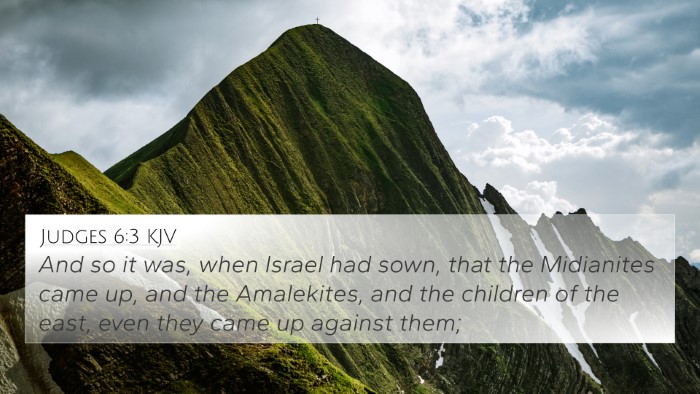
Judges 6:3 (KJV) »
And so it was, when Israel had sown, that the Midianites came up, and the Amalekites, and the children of the east, even they came up against them;
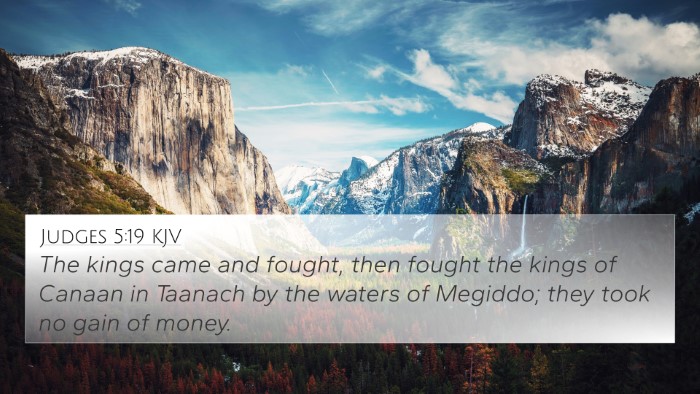
Judges 5:19 (KJV) »
The kings came and fought, then fought the kings of Canaan in Taanach by the waters of Megiddo; they took no gain of money.
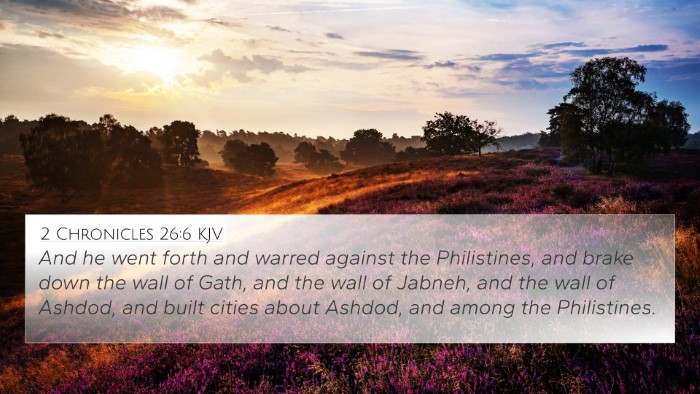
2 Chronicles 26:6 (KJV) »
And he went forth and warred against the Philistines, and brake down the wall of Gath, and the wall of Jabneh, and the wall of Ashdod, and built cities about Ashdod, and among the Philistines.
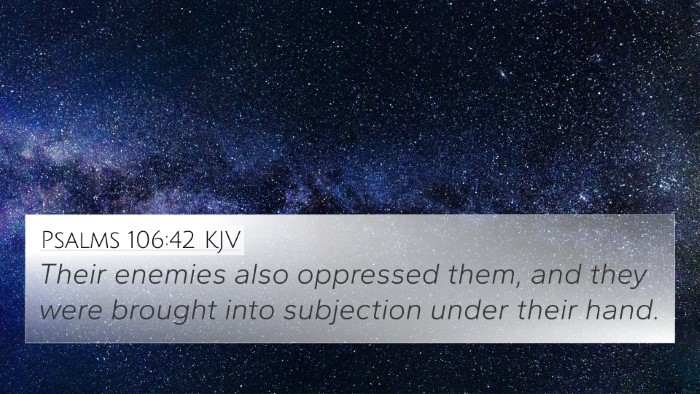
Psalms 106:42 (KJV) »
Their enemies also oppressed them, and they were brought into subjection under their hand.
Judges 10:12 Verse Analysis and Similar Verses
Understanding Judges 10:12
Judges 10:12 states, "The Sidonians also, and the Amalekites, and the Maonites did oppress you; and ye cried to me, and I delivered you out of their hand." This verse reflects the cyclical nature of Israel's relationship with God, characterized by sin, oppression, repentance, and deliverance.
Summary of Insights
This verse provides insight into the history of Israel's struggles against neighboring nations, exploring themes of oppression and divine rescue. The Israelites repeatedly found themselves in distress due to their enemies' oppression, yet God was faithful to respond to their cries for help, illustrating His enduring mercy and commitment to His covenant people.
Key Themes
- Oppression: The verse details how Israel was oppressed by multiple nations, namely the Sidonians, Amalekites, and Maonites. This highlights the recurring plight of Israel against external threats.
- Divine Response: It underscores God's responsive nature; despite Israel's unfaithfulness, He delivered them when they repented and cried out to Him.
- Covenant Relationship: This interaction showcases the covenantal relationship between God and Israel, where God promises protection and deliverance in response to their repentance.
Commentary Insights
Matthew Henry's Commentary: Henry emphasizes the faithfulness of God in delivering His people aside from their unfaithfulness. He notes that God's willingness to save is ever-present, reflecting His nature as a compassionate Savior who listens to His people’s cries.
Albert Barnes' Notes: Barnes elaborates on the specific nations mentioned in the verse, noting their historical roles as oppressors of Israel. He reflects on the importance of Israel recognizing their need for God’s help, suggesting that the acknowledgment of their plight was crucial to their deliverance.
Adam Clarke's Commentary: Clarke highlights the educational aspect of Israel’s suffering, suggesting that their oppression served to teach them about reliance on God. He underscores that the cyclical pattern of sin, suffering, and salvation is intended to lead the Israelites closer to God.
Bible Verse Cross-References
- Exodus 2:23-25: This passage describes how God heard the cries of the Israelites in Egypt, showing a pattern of divine deliverance.
- Judges 3:9: Illustrates God’s deliverance when the Israelites cried out in distress.
- Judges 6:6: Another instance of Israel crying out to God during oppression.
- Psalm 34:17: "The righteous cry, and the Lord hears, and delivers them out of all their troubles." This verse emphasizes God's attentiveness to the cries of His people.
- 2 Chronicles 33:12-13: Reflects the theme of repentance resulting in divine deliverance.
- Isaiah 30:19: Encourages trust in God for assistance, reinforcing the importance of calling upon Him in distress.
- Romans 10:13: “For everyone who calls on the name of the Lord will be saved,” aligning with the theme of seeking divine help.
Exploring Themes Through Cross-Referencing
By cross-referencing Judges 10:12 with these passages, readers can see the broader theological context of oppression and divine rescue within Scripture. Understanding these connections enhances the appreciation of God’s consistent character as a Savior and emphasizes the importance of remaining vigilant in faith.
Tools for Bible Cross-Referencing
For those seeking to delve deeper into cross-referencing Biblical texts, several tools and methods can aid in this study:
- Bible Concordance: A helpful resource for locating verses and understanding their context.
- Bible Cross-Reference Guide: Useful for identifying related verses and themes.
- Bible Cross-Reference System: Techniques for systematically connecting influential texts.
- Bible Reference Resources: Various online and print resources designed to assist study of interrelated scriptures.
Using these tools, readers can undertake a comparative Bible verse analysis to explore the profound connections between the Old and New Testaments, enhancing their understanding of Biblical themes and narratives.
Conclusion
Judges 10:12 is a testament to God's enduring fidelity in responding to His people's cries for help despite their recurrent unfaithfulness. Each reference deepens our understanding of the rich narrative woven through Scripture, highlighting the thematic connections that bind the Biblical text together.
